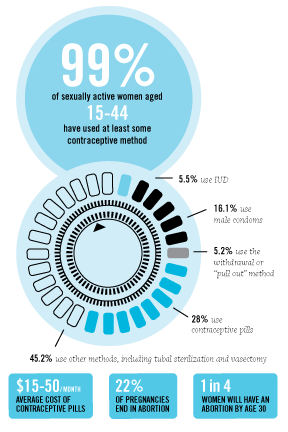A Hard Pill to Swallow: Contraception and Contemporary Politics

According to Jessica Waters, assistant professor at American University in Justice, Law and Society, contraception is becoming a state issue largely because of the Affordable Health Care Act and the upcoming election.
“I think some of this is part of the primary season,” Waters said. “When we have Republican candidates playing to the right and playing to their most conservative base and you have a couple of Republican candidates willing to take that stance…that’s part of it. Part of it is just politicking.”
Additionally, states have been introducing fetal personhood measures, which would codify the fetus as a person. “They propose initiatives that are written so broadly that there are questions as to what they should cover,” Waters explained, saying with attempts to define what a fetus is, “We’re seeing other things get swallowed up. I think that’s purposeful.”
Such a measure was passed in Oklahoma this year, and similar measures have been rejected in Virginia and Mississippi. Elizabeth Nash, the state issues manager for the Guttmacher Institute, argued the fight for contraception has already become a state issue because of these fetal personhood measures. She rattled off a list of states that have become particularly unfriendly to the right to choose.
“Kansas, Nebraska, Arizona, Oklahoma, South Dakota, Indiana, and now Mississippi, Utah and Virginia,” Nash laughed. “Okay, there’s half the country.”
Last year saw a record 92 provisions in state laws that restrict abortion, according to a study by the Guttmacher Institute. The locations are noteworthy because in most states Republicans gained power of state governments in 2010.
“What does seem clear is those who oppose reproductive health have clear conservatives at the state level and they have a lot of success. Now they’re turning their sights on family planning,” Nash said.
In the 2008 election, abortion continued to be the centeral social issue, but contraception was not. In 2006, former Governor Sarah Palin said, “I’m pro-contraception, and I think kids who may not hear about it at home should hear about it in other avenues.” In the 2008 election, Palin amended her statement to say she believed in abstinence only education, but to offer alternative solutions as well.
Because of the Affordable Health Care Act, contraception will continue to be an issue in the 2012 election. Waters explained this election has shifted into a debate about health care reform as a whole.
“People may not understand the intricacies of health care reform,” Waters said. “They understand ‘I have sex and if I have sex and it’s unprotected, I might have a baby.’ People have views on that. So they’re sound-bite issues, they’re easy issues, they’re hot button issues and they’re ones you can play to your base.”
According to Waters, the comments from the past few months are not new. In February, the House Oversight and Government Reform Committee met to discuss the Obama administration’s controversial decision to require employers to provide birth control to employees. The panel was all-male, which brought harsh criticism from the feminist community. A woman named Sandra Fluke was unable to speak because her testimony was not submitted on time. When she was invited back to speak, she became a scapegoat for slutty college students everywhere.
Conservative radio sensation Rush Limbaugh said of Fluke on his radio show, “She wants to be paid to have sex. She’s having so much sex she can’t afford the contraception. She wants you and me and the taxpayers to pay her to have sex. What does that make us? We’re the pimps.” Limbaugh’s show has lost 140 advertisers since he first made those comments.
Many other Republican commentators have denounced the use of birth control, demonizing contraception as just as harmful as abortion. Besides a complete lack of knowledge about how to use birth control (hint: it’s not like a condom—you don’t take it every time you have sex), the language is problematic because it could restrict women under the poverty line from knowing about contraception.
“Do I think we’re going to see something where there’s an outright ban on birth control? No. Do I think that we will see continued efforts on who has access to it, particularly for low income women? Yes,” Waters said.






